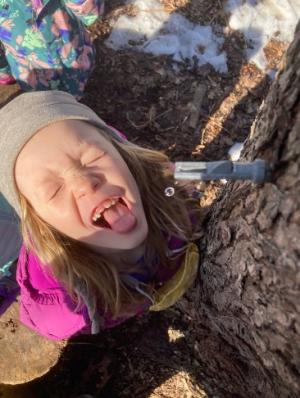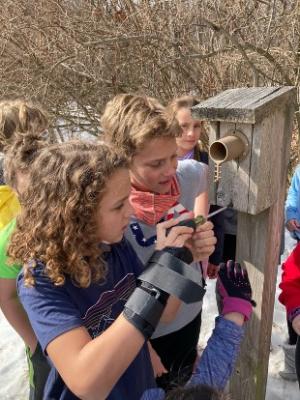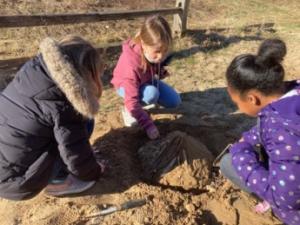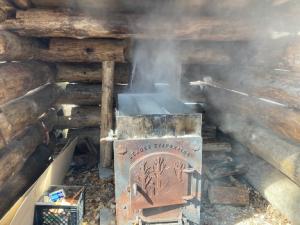What an amazing month we had for OE. With March came the syrup season. We had a lot of fun at the sugar shack learning the process of sugaring, collecting sap and tasting the product. The whole process is a lot of work, but a lot of fun. It was great to have a lot of help from our volunteers who tended the fire: Bill Hoo, Mark DeKoster, Jan Hollander, and Bob Boersema. We also owe appreciate the strong effort by the 7th grade class to collect the sap from the 60-some taps around school.
 Kindergarten spent some time learning about the syrup making process and was able to enjoy tasting both the sap and the syrup. We even tapped a tree as a class. Later we spent time focusing on changes in spring. We spent one day learning the letters of the week for R,W and J by running, rolling, jogging, jumping, walking, watering, listening for ribbits, and picking up waste and junk. They also got to plant their own Kindergarten Salad Garden, which is growing splendidly.
Kindergarten spent some time learning about the syrup making process and was able to enjoy tasting both the sap and the syrup. We even tapped a tree as a class. Later we spent time focusing on changes in spring. We spent one day learning the letters of the week for R,W and J by running, rolling, jogging, jumping, walking, watering, listening for ribbits, and picking up waste and junk. They also got to plant their own Kindergarten Salad Garden, which is growing splendidly.
[IMAGE '1844' /]The first graders had the chance to play vet on our pregnant goats, listening with stethoscopes to hear all the sounds going on inside the mamas: breathing, digesting, heartbeats--maybe even that of the baby goats! They also helped us do some goat chores: feeding, watering, and cleaning the stall in preparation for kids, which have now arrived! Since they were studying weather in class, we also made our own wind vanes and even a kite! Fortunately, we had a couple of good windy days to try them out. For the 1st grade herb garden, we planted some more perennial herbs (borage, chamomile, sage, thyme, rosemary, and hyssop). Extras will be available for sale at our spring plant market.
2nd - Our second graders finished up their OE studies on cardinal direction and pacing by hiding and finding letterboxes (a really cool thing to do on your next trip to the park or family vacation). They also got to hear the legends of the discovery of syrup (some true and some less true and had to distinguish between them), collect sap, and stoke the sugar shack fire. We worked hard to weed out the garden, add compost, prepare beds, and plant a few new spring crops, as well as prepare the space for planting the Three Sisters Garden in May.


5th - 5th graders took some time to learn about decomposers and particularly, worms by studying them and even performing a readers theatre set in Soil City. Then using worms from the compost, students created experiments to understand how different conditions affect the worm’s decomposition efforts. They tested variables like temperature, moisture, soil type and food. The little worm pets were a lot of fun to observe. We also discussed what to expect when you’re expecting baby goats! We learned a little about kidding season: labor, birth, taking care of kids, and eventual weaning, dehorning, and neutering.
6th - 6th graders learned about chicken eggs this month and what their appearance has to tell us about the chickens’ health, happiness, and diet. We are creating a book about chicken chores to share with next year’s 6th graders, so we had some time to work on that, discuss our profits and expenses, and imagine improvements we can make for our chickens and our Got Yolk business.

8th - 8th graders have been keeping an eye on their fast plants for the upcoming unit on genetics. The plants blossomed and students used bees on a stick to pollinate the flowers. When the seeds are ready they will be replanted and we will see how the traits were passed along to the new seedlings. Eventually students will compare our study to Mendel’s work and create punnett squares to understand the results.
